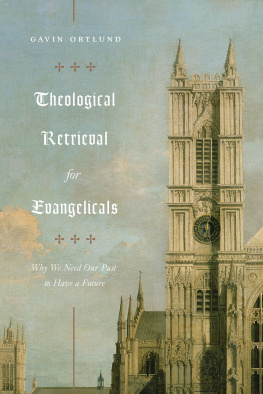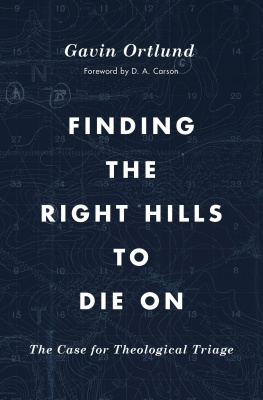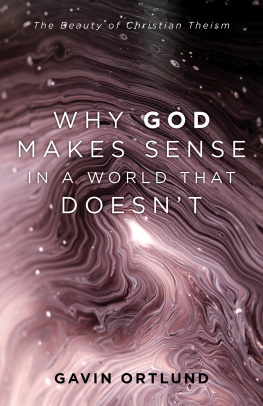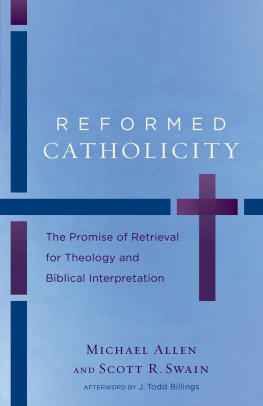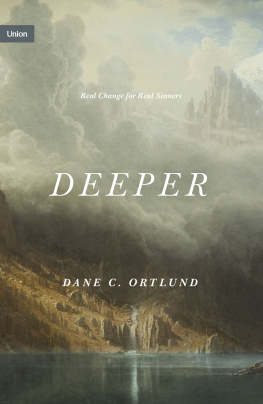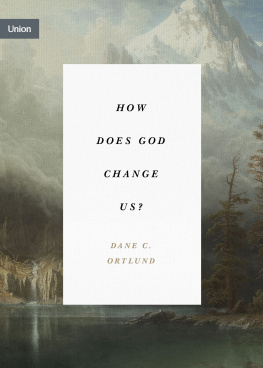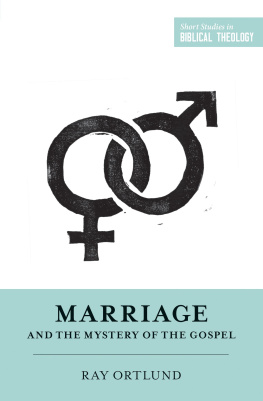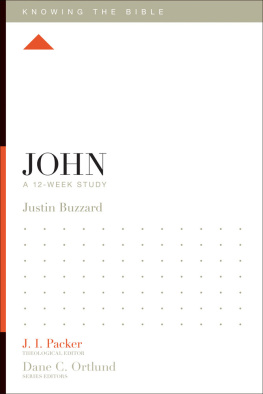Gavin Ortlund - Theological Retrieval for Evangelicals: Why We Need Our Past to Have a Future
Here you can read online Gavin Ortlund - Theological Retrieval for Evangelicals: Why We Need Our Past to Have a Future full text of the book (entire story) in english for free. Download pdf and epub, get meaning, cover and reviews about this ebook. year: 2019, publisher: Crossway, genre: Religion. Description of the work, (preface) as well as reviews are available. Best literature library LitArk.com created for fans of good reading and offers a wide selection of genres:
Romance novel
Science fiction
Adventure
Detective
Science
History
Home and family
Prose
Art
Politics
Computer
Non-fiction
Religion
Business
Children
Humor
Choose a favorite category and find really read worthwhile books. Enjoy immersion in the world of imagination, feel the emotions of the characters or learn something new for yourself, make an fascinating discovery.
- Book:Theological Retrieval for Evangelicals: Why We Need Our Past to Have a Future
- Author:
- Publisher:Crossway
- Genre:
- Year:2019
- Rating:5 / 5
- Favourites:Add to favourites
- Your mark:
- 100
- 1
- 2
- 3
- 4
- 5
Theological Retrieval for Evangelicals: Why We Need Our Past to Have a Future: summary, description and annotation
We offer to read an annotation, description, summary or preface (depends on what the author of the book "Theological Retrieval for Evangelicals: Why We Need Our Past to Have a Future" wrote himself). If you haven't found the necessary information about the book — write in the comments, we will try to find it.
Gavin Ortlund: author's other books
Who wrote Theological Retrieval for Evangelicals: Why We Need Our Past to Have a Future? Find out the surname, the name of the author of the book and a list of all author's works by series.
Theological Retrieval for Evangelicals: Why We Need Our Past to Have a Future — read online for free the complete book (whole text) full work
Below is the text of the book, divided by pages. System saving the place of the last page read, allows you to conveniently read the book "Theological Retrieval for Evangelicals: Why We Need Our Past to Have a Future" online for free, without having to search again every time where you left off. Put a bookmark, and you can go to the page where you finished reading at any time.
Font size:
Interval:
Bookmark:
Divine Simplicity in Patristic and Medieval Perspective
No one, not of men only, but even of supramundane powers, and the Cherubim, I say, and Seraphim themselves, has ever known God, save he to whom He revealed Himself.
John of Damascus
![]()
Since the publication of Alvin Plantingas Does God Have a Nature? in 1980,
While much of the developing discussion concerning divine simplicity is philosophical, this chapter seeks to approach divine simplicity from a historical route in an effort at theological retrieval. It will explore how divine simplicity has been formulated in patristic and medieval theology, particularly with a view to the problem of how divine simplicity relates to the doctrine of the Trinity, and with special attention to some treatments of divine simplicity in the churchs history that have hitherto received less attention, such as those of It will be suggested that approaching divine simplicity from a historical angle may enrich the contemporary discussion and supplement some of Dolezals claims.
perichoresis , which is often used today for a similar purpose.
The Complexity of Simplicity
It is frequently noted that the doctrine of divine simplicity has been a recurrent feature of the churchs theology throughout patristic, medieval, and post-Reformation traditions.
Examples of the weaker version of divine simplicity are not merely present in contemporary literature as accommodations to the criticisms of For Gregory and Basil, divine simplicity served as part of their effort to establish the full deity of the Son and the Holy Spirit, while also grounding orthodox Trinitarianism as firmly monotheistic. It did not entail that God was identical with his properties, and both theologians rejected this idea.
In affirming a weaker version of divine simplicity, these
In the seventh century,
In his later chapter devoted to divine simplicity, On the Orthodox Faith 1.9, John responds to the difficulties raised by predicating diverse attributes of a simple God by appealing to the Cappadocians distinction between the essence and energies of God. John affirms that each of Gods attributes is itself simplethus, his omnipresence (what he refers to as God being uncircumscribed) is simple,
Divine Simplicity in the Life of the Church
In the contemporary literature divine simplicity is often regarded as a philosophical consequence within the doctrine of God, disconnected from church life. Christians of earlier eras, however, consistently regarded divine simplicity as a living part of their witness and worship. In the late second century To consider divine simplicity as an aspect of divine beauty, or to utilize it in the context of theistic apologetics, is to step into a larger domain of concerns than is typically present in contemporary treatments of the doctrine.
Upon first consideration, this might seem like an unlikely verse to correlate with divine simplicity, but Anselm claims that what has been established by divine simplicity is that one necessary which is all goodor rather, which is itself the complete, one, total, and unique good. For Anselm, divine simplicity establishes God as the aim of the human soul, the supreme good which captures every human longing. Anselms treatment of divine simplicity differs from Aquinass in its worshipful tone and its theological purpose; if for Thomas divine simplicity is a placeholder by which to organize divine attributes, for Anselm it is a ladder by which to see more of the divine beauty.
For him, a simple God was not cut off from composite creation by virtue of its simplicity but rather had a dynamic relationship with creation, grounding its own diversity and ultimately converting divided creation into its own simplicity:
The divine effulgence and energy, being one and simple and indivisible, assuming many varied forms in its own goodness among what is divisible and allotting to each the component parts of its own nature, still remains simple and is multiplied without division among the divided, and gathers and converts the divided into its own simplicity.
For John, as for Pseudo-Dionysius, the redemption of fallen creatures involved some kind of translation into divine simplicity, making this doctrine a part of the churchs salvation as well as her theology.
Just as contemporary philosophical treatments of divine simplicity should recognize diversity in how divine simplicity has been defined through church history, not considering a refutation of Aquinas as tantamount to a refutation of divine simplicity wholesale, so also contemporary treatments of divine simplicity may be strengthened by considering this liturgical, aesthetic dimension to divine simplicity and the way it has been so naturally correlated with other Christian doctrines. Sensitivity to divine simplicitys setting in the life of the church over the centuries may, for instance, raise questions and concerns about the implications of its acceptance or rejection that do not otherwise come into view. Even if it ultimately needs to be removed, a doctrine so embedded in the churchs life and worship throughout the centuries probably requires something more like a surgical procedure than a swift amputation.
The Supraessential Essence: Simplicity and Ontology
A brief foray into the churchs historical reflection on this topic provides a greater vantage point for considering the strength of these claims, especially Dolezals.
The writings of Plotinus, which exerted great influence on the churchs formulation of divine simplicity, particularly reveal the close relationship between divine simplicity and how one construes the Creator/creation relationship. Plotinus differed from earlier Platonists by claiming that the One or the Unity existed prior to the divine intellect, because the divine intellect is composite. He wrote:
Generative of all, the Unity is none of all; neither thing nor quantity nor quality nor intellect nor soul; not in motion, not at rest, not in place, not in time: it is the self-defined, unique in form or, better, formless, existing before Form was, or Movement or Rest, all of which are attachments of Being and make Being the manifold it is.
Because he viewed the One/Unity as prior to being itself, Plotinus regarded it as belonging to an entirely different ontological framework than the rest of reality and as such not subject to the language and logic that govern all other reality.
In a more lengthy statement to this effect, he applied this notion to Gods unity and triune life:
The fact that the transcendent Godhead is one and triune must not be understood in any of our own typical senses.... We use the names Trinity and Unity for that which is in fact beyond every name, calling it the transcendent being above every being. But no unity or trinity, no number or oneness, no fruitfulness, indeed, nothing that is or is known can proclaim the hiddenness beyond every mind and reason of the transcendent Godhead which transcends every being.
For a thinker like Pseudo-Dionysius, the relation of divine simplicity and Trinity is not a problem to be explained in creational categories, since both terms apply to that which is beyond every name. He uses divine simplicity and Trinity to explain unity and diversity in creation; he apparently does not consider that they need explanation themselves.
This approach to the relation of God and creation among classical theologians differs from that implicit in many contemporary treatments of divine simplicity. One might summarize the matter by suggesting that much of the discussion of divine simplicity in contemporary philosophy tends to approach God within a larger structure of reality, while its discussion in classical theology tended to approach reality itself as subsisting within the being of God. In classical theology, God was not an existing thing as much as he was above existence as the ground of existing things; it was not a question of whether his simplicity was logically coherent as much as a question of how to ground logical coherence itself. Classical theologians did not approach God and creation as two different items within the same genus or rank, or even two different kinds of genus or rank, for the very potential for distinction between different kinds of reality was itself grounded in the being of God. For classical theology, God was the basis for being itself and therefore cannot be subjected to a scale of being. He was the ground of every spectrum and therefore could not be placed on any spectrum.
Font size:
Interval:
Bookmark:
Similar books «Theological Retrieval for Evangelicals: Why We Need Our Past to Have a Future»
Look at similar books to Theological Retrieval for Evangelicals: Why We Need Our Past to Have a Future. We have selected literature similar in name and meaning in the hope of providing readers with more options to find new, interesting, not yet read works.
Discussion, reviews of the book Theological Retrieval for Evangelicals: Why We Need Our Past to Have a Future and just readers' own opinions. Leave your comments, write what you think about the work, its meaning or the main characters. Specify what exactly you liked and what you didn't like, and why you think so.

